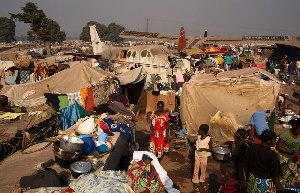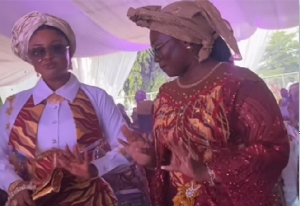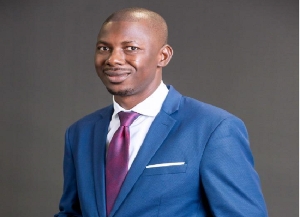- Home - News
- TWI News | TV
- Polls
- Year In Review
- News Archive
- Crime & Punishment
- Politics
- Regional
- Editorial
- Health
- Ghanaians Abroad
- Tabloid
- Africa
- Religion
- Election 2020
- Coronavirus
- News Videos | TV
- Photo Archives
- News Headlines
- Press Release
Opinions of Saturday, 17 September 2016
Columnist: Tsuo, Cedric
Why Ghana will remain a stunted child
On 7 December 2016 Ghanaians will once again go to the polls to elect a president and members of parliament for the next four years.
The campaigns are already in overdrive, although our two main political parties, NDC and NPP have yet to unveil their manifestos fully.
By the time a new government fully takes the reins of power, Ghana will be 60 years old on 6 March 2017. Very likely, the new government’s first major pre-occupation will be preparations for celebrating our 60th birthday.
These two important national events, following closely on the heels of each other, raise two reflective questions in my mind. First, what kind of programmes are our main political parties offering in this year’s election: a variation on the same old disjointed politically expedient short-term projects or a long-term policy vision, backed up with credible and progressive delivery plan that will launch Ghana firmly on a trajectory to real and incremental development?
Secondly, what shall we be celebrating: the mere number of years that Ghana has been independent or world-class social, economic, political and educational advancements? These are terribly important questions that should exercise the minds of all political parties, as well as all Ghanaians, as we approach another election.
I believe that unless we, all Ghanaians, including our politicians who think and behave as if they are God’s gift to Ghana, learn to be our own harshest critics and honestly accept that in spite of our pedigree we are nowhere near where we should be in the world development league table, Ghana will forever remain a stunted child.
Disappointingly, most of the campaign messages so far leave me sceptical about the ability of Ghana to develop in an ambitious, rational and consistent manner. Ghana was richly endowed at birth with abundant natural and human resources. Yet at 60, we are light years away from small landlocked Botswana, Malaysia and Singapore. Why is that so? There must be something our successive post-Dr. Kwame Nkrumah civilian governments either have not been doing right or have lacked or both.
There may be other reasons why in development terms Ghana is stuck in its soiled diapers but, for me, the main reasons are dearth of visionary political leaders and myopic, toxic party politics.
We do not have any political leaders today imbued with national ambition, as opposed party ambition; leaders who can think and formulate long-term development policies, say, 40 to 50 years ahead and plan implementation accordingly; leaders who can attract to themselves the best possible Ghanaian talents, whatever their political colour; leaders who can build, support and respect strong state institutions; not least, leaders who can successfully challenge the popular view that there can never be another Dr. Kwame Nkrumah in the history of our potentially great country.
If I asked President John Mahama and Nana Akufo-Addo today where they envisaged seeing Ghana in 40 to 50 years’ time and their election promises today would get us there, they would not be able to tell me. This is because their horizon ends at the next four years.
In Ghana, winning an election has become an end in itself; naked quest for power and all the personal well-being and opportunities that go with it.
Hence, our political leaders try to outbid each other with populist short-term vote-winning inconsequential projects. They promise to do this or that; they promise free this, free that. My only surprise is that they have not yet promised free funerals for all Ghanaians, if elected! What is happening in Ghanaian politics in effect is that those in government use governmental powers and resources to create political patronage, dependency syndrome, which stifles individual initiative and responsibility.
This is enslavement, making the electorate always to be beholden to government. This is morally wrong. If parents have money to burn on lavish funeral revelries and ostentatiously vulgar and obscene coffins, they should be allowed to assume some parental responsibility by at least paying examination registration fees for their children.
In a culture of governmental largess, there cannot be much room left for thinking about long-term national interests.
Not too surprisingly, the campaign messages from both the President and Nana Akufo-Addo are devoid of cohesive national ambition, policy vision, and delivery plan. Besides offering free things, the President’s campaign message is that he has laid “a solid foundation” for development in his first term and now needs a second term to finish his “transformation agenda”.
One wonders what that foundation is concretely on the ground and where it will take Ghana to in 40 to 50 years’ time, or even in 20 years’ time, or would accelerate Ghana closer to where our peer countries are today.
The President borrowed huge amounts of money which he claimed he spent on infrastructural developments. But his new roads are all sub-standard and already badly in need of repair; the few new Senior High Schools are ill-staffed and ill-equipped.
The old ones are falling apart from lack of maintenance. The performance of our Senior High Schools in the WASSCE is a national disgrace. Yet the President continues to deny that our educational system is broke and needs a major surgery.
No one expects Ghana to have Harvards, Londons, MITs, Oxbridges, etc. etc., but we should not settle for mediocrity either.
In the power sector, the President has promised that “Ghana will become energy sufficient by the end of 2017,” with surplus to export. Perhaps, the President needs reminding that his predecessor, Professor John Attah Mills, made the same promise in 2008, saying power outage would be “a thing of the past”.
The President himself made the same promise in 20012, and now in 2016 he is making the same promise and expects Ghanaians to trust his word This is stretching our gullibility or indulgence a bit too far. What Ghana needs is a permanent solution to the problem, not another short-term fix. And the President seems to have no such plan.
The Minister for Trade and Industry, Dr. Ekow Spio Garbrah, who famously described Professor John Attah Mills’ government as “Team B”, speaking on the issue, (Ghana web 10 June 2016) was happy going into detailed statistics to show that in spite of “dumsor Ghana is still a country that is ahead of most African countries in power production”, and how in terms of population Ghana was doing better than even Nigeria, concluding triumphantly that “in fact, there are about five or six West African countries which when put together have less power production than Ghana.”
The President himself recently used a similar argument, saying Ghana was second only to South Africa in power production.
Perhaps, the President and “Team A” Minister could also explain to us how the knowledge that Ghana produces more power than some other African countries is a solution to our own problem here in Ghana, when, for instance, factories are closing down or running below capacity, with loss of thousands of jobs and income, because of lack of power. Comparisons like these are hardly a mark of a visionary and ambitious leader.
On the NPP side, Nana Akufo-Addo’s personal ambition to be president and his vision of his own place in Ghana history appear to come across more convincingly than some of his promises. His ambition, as he put it: “What I am hoping and fighting for is that when the history of Ghana is being written in the time of our grandchildren, they will say that it was when Nana Dankwa Akufo Addo became president that Ghana became prosperous, and when they saw the benefits of progress and prosperity in our time (Ghana web 9 August 2016).”
Similarly, he told the people of Bunkprurugu in the Northern Region he had “tried twice to open the door of Ghana” but it didn’t open, now “I am making a third effort to open the door of Ghana; this time I want your support to be able to do so. I want your support so we can go into Jubilee House and begin to rebuild our country and bring prosperity to all parts of Ghana.” (Ghana web, 30 August 2016).
How does Nana Akufo-Addo plan to bring about that “prosperity”? Let’s take two of his promises. First, he promises to build a factory in each of our 217 districts. That promise appears to embody some new ideas. In principle, it can lead to some long-term employment.
However, questions remain as to whether Nana has already carried out the necessary feasibility study in each district, the type of factory suited to each, sources of power, water, raw materials, environmental protection and, not least, initial cost and how it is to be raised.
Is Nana Akufo-Addo ready with the plan to hit the ground running immediately after his inauguration, and when in his presidency would the factories become operational?
Secondly, like the President, Nana Akufo-Addo has promised to “fix dumsor”, arguing that the “problem is ultimately a financial problem (Ghana web, 30 August 2016).” I am not a power expert but it appears to me that just throwing money at the problem would not solve it, at least, not in the long-term. A permanent solution will require both in-depth technical and resource evaluation and appropriate technology.
It is true that Nana’s running mate, Dr. Bawumia, has fleshed out the plan a bit, presenting it as a ten-year plan. What is not clear, however, is whether NPP is promising to produce a permanent solution within that time-frame. The UK, for example, does not have energy problem at the moment yet its government already has finalised plans to build four nuclear power plants to ensure continued supply into the next forty years and beyond. Why is it that Ghanaian political leaders are so lazy or incapable of thinking that far ahead?
They are very good at ignoring potential problems until they occur and then run around trying to solve it at a higher cost than if they had taken action sooner.
This is how I imagine visionary leader thinking. Ghana is lagging far behind peer countries, the reason why and the efforts that would be required to catch up. We should find entirely new ways and approaches, followed by identification of the most critical areas of action that would help initiate and sustain development.
We need to secure Ghana’s coast. The country has a very serious sea erosion problem. Ghana’s landmass today is less than what it was in 1957.
From Cape Coast to Aflao, Ghana is steadily losing land to sea erosion, with potential for humanitarian and environmental catastrophe of immense proportions. Ghana is sitting on a ticking time bomb.
The problem is much bigger than tossing a few truckloads of rock here and there into the sea or compensating fishermen for loss of equipment. The cost of arresting the onslaught of the sea is incalculable but preventive measures are required today.
The role of government is not to stifle individual initiative but to create an enabling environment and conditions in which it can flourish.
First class educational institutions and educated force are engines for growth and development but Ghana’s educational institutions and products are not fit for purpose. We need a rethink of our finances, especially generating revenue and controlling expenditure. A permanent solution to our energy problem ranks among top priorities.
Quality of life and productivity require availability of potable water, descent housing, sanitation, town planning, and clean environment. Maintaining a healthy and productive population requires well-equipped and maintained hospitals, clinics and public facilities. Ensuring food security for domestic consumption, local industries and export requires revamping and modernising agriculture.
Transport, modern technology and communication propel growth. The list is not exhaustive. All these components must be integrated in a policy document accompanied by a rational stage by stage implementation schedule.
What we become tomorrow is determined by what do or fail to do today. I challenge both the President and Nana Akufo-Addo to tell Ghanaians where they want to take Ghana in 40 to 50 years’ time and how their present manifestos will be one building block towards that ultimate goal.
If they knew they won’t be playing childish game of sitting on their manifestos for fear of one party stealing the other party’s ideas.
They remind me of the story of two five-year girls fighting over a doll, each claiming it is to be hers. They pull and tug until the doll rips into two pieces. Each girl saunters away clutching her torn piece to her chest, shouting happily: “I have got my doll back!”; “I have got my doll back!!” forgetting the fate of the poor doll (for “doll”, read Ghana). In this connection, I wonder what became of the forty-year development plan drawn up by the National Development Commission.
Are political parties not supposed to reflect the plan in their manifestos? If they did, there would be no reason for mutual suspicion. As has been the case in all previous elections, insular petty party politics has triumphed again over long-term Ghana national development interests.
Unless Ghanaian politicians and political parties accept that what Ghana needs most are ambitious and visionary leaders who look 40 to 50 years ahead with well-thought out policy and implementation plan and avoid party election manifestos geared to winning elections, Ghana will remain a stunted child, while our political masters grow fat, wallowing in power, wealth and their own self-importance.











